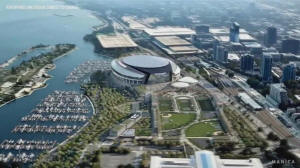Illinois museums want $70 million in taxpayer funds, no match
requirements
 Send a link to a friend
Send a link to a friend
 [May 15, 2024]
By Catrina Petersen | The Center Square [May 15, 2024]
By Catrina Petersen | The Center Square
(The Center Square) – Illinois’ museums want $70 million from Illinois
taxpayers in the coming fiscal year.
In addition to the $70 million, museums want to do away with matching
requirements. Jeanne Schultz Angel, Illinois Museum Association
president, said matching requirements are a challenge to meet because of
the lack of institutional funding for private donations.
“Museums are public institutions and they are absolutely vital places
for education and they’re collecting institutions,” Schultz Angel said.
"Museums as collecting institutions need places to keep collections not
for 10 years, 20 years, but for 200 years and that takes buildings and
investment."
State Rep. Kam Buckner, D-Chicago, supported both the appropriation of
$70 million and the removal of matching requirements.
“Today, we are calling for that $70 million funding but also to remove
current matching requirements to empower museums to embark on capital
projects that are essential for their growth and revitalization for a
post-pandemic cultural economy,” Buckner said. “Our museums are much
more than buildings; they're educational powerhouses.”
The American Alliance of Museums data says that in 2023, 28% of U.S.
adults reported having been to a museum in the past year.

Matching requirements are based on museum attendance. For example, for
public museums with attendance of 300,000 or fewer people during the
preceding calendar year, no match is required. But public museums with
attendance of over 600,000 during the preceding calendar year, the match
must be at a ratio of $2 from local and private funds for every $1 in
state funds.
Perri Irmer, president and CEO of the DuSable Museum of African American
History, said there’s a direct correlation between the damage done
during COVID and attendance.
“Every public facing position at the DuSable Museum was laid off and
that obviously affected our earned income as well,” said Irmer.
Chicago Mayor Brandon Johnson is going all in for a multibillion dollar
Chicago Bears stadium, defending the massive project as a good thing for
public recreational space and tourism.
Chicago Adler Planetarium’s Andrew Johnston was asked about possible
revenue enhancements coming to the museum if the Bears’ plan was
hypothetically approved. Johnston said the plan, if approved, could
improve visitor accessibility.
[to top of second column]
|

A rending of the proposed Chicago Bears lakefront stadium complex
unveiled Wednesday
Chicago Bears

“From our standpoint, we look forward to looking at how things develop
in the future and if there are parts that could include infrastructure
improvements, especially accessibility improvements, because we are
right next to this amazing downtown Chicago but it’s hard to get to us
because you have to cross Lake Shore Drive. If there’s some component of
that [the Bears’ plan] that enhances accessibility, we’d be interested
in seeing how that develops,” said Johnston.
Buckner said no matter what happens with the Bears' proposal, the
institutions that have been there have to be included in conversations
surrounding developments.
When asked if the museums in Chicago could just ride the economic
coattails of the Bears' stadium proposal instead of appropriating the
entire $70 million right now, Buckner said "no."
“It's a proposal. It did not come down from Mount Sinai on stone
tablets. They’re going to have to change some of what they’re doing.
These places [museums] are institutions of truth and they’ve been
threatened a lot. Antisemitism, anti-Black sentiment, anti-Latino
sentiment, because they stand for that truth," he said. "While we should
pontificate about the football team, that should have nothing to do with
the investing in the cultural infrastructure in this state.”
The Bears' stadium proposal is not just the stadium itself. It will
include the surrounding park area, and the infrastructure around the
Museum Campus. The surrounding infrastructure is expected to cost $1.5
billion. The total cost of the Bears plan is $4.7 billion. Part of that
could come by way of taxpayers through existing hotel/motel taxes and a
state agency bonding authority.
According to the annual survey conducted by the American Alliance of
Museums, for about one in five museum-goers, violence and crime is a
concern. The survey found urban museums (such as in Chicago or New
Orleans) seem to be more challenged by crime issues than other museums,
especially rural ones.
“Street crime and violence in Chicago makes us less likely to go there,”
said a survey respondent. “Inflation problems, violence and bad weather
make visiting museums out of the city of residence more difficult. Costs
are greater and safety is not ensured.”
 |